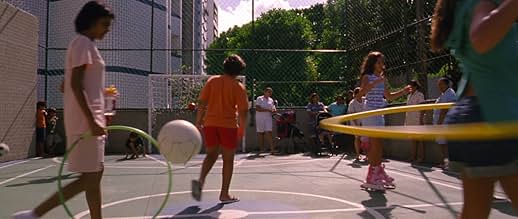Aggiungi una trama nella tua linguaThe lives of the residents of a Brazilian apartment building and the security guards who get the job guarding the surrounding streets.The lives of the residents of a Brazilian apartment building and the security guards who get the job guarding the surrounding streets.The lives of the residents of a Brazilian apartment building and the security guards who get the job guarding the surrounding streets.
- Regia
- Sceneggiatura
- Star
- Premi
- 39 vittorie e 23 candidature totali
- Mariá
- (as Mauricéia Conceição)
Recensioni in evidenza
Antonioni's own characterization of his 1960 masterpiece, L'Avventura, is a good fit for Filho's first feature, "Nothing," he said," appears as it should in a world where nothing is certain. The only thing certain is the existence of a secret violence that makes everything uncertain." Unlike many Brazilian films, this is not about favelas or drugs, but about the uneasy divide between a growing middle-class and their help living side-by-side in a crowded urban setting. Scenes are framed behind fences and grated doors to suggest maximum isolation, a suggestion that in today's Brazilian urban areas, a melting pot is built out of necessity, not of choice.
The film opens with a montage of black and white photos of workers in a sugarcane plantation peering into the camera with tools raised, and sweat accumulating on their faces from slaving in the fields in the heat of the day. The weary faces suddenly melt into the shot of a young girl on rollerblades in a parking lot surrounded by tall white-walled condos. Like Lucretia Martel's La Cienaga, Neighboring Sounds unfolds in a series of small incidents that convey an atmosphere of encroaching claustrophobia. Pointing to the local power structures that rule the streets, the block is run by the local "don," Francisco (W. J. Solha), a wealthy landlord with a questionable past. João (Gustavo Jahn), Francisco's grandson, is a real estate agent for the family who has established a promising relationship with Sofia (Irma Brown).
Accumulated incidents shape the film's message. João and Sofia are caught naked in their living room by the arriving housemaid Maria (Mauricéa Conceicão) who makes light of the incident, engaging in conversation with João and Sofia in the confining space of his kitchen. Bia (Maeve Jinkins), another nearby resident trying to raise two small children, is consumed by managing her domestic help, organizing English and Mandarin lessons for her young children, while drugging the neighbor's dog, amusing herself by smoking pot delivered to her by a drug-dealing water delivery man, and masturbating to the whir of the washing machine. Meanwhile, Sofia tells João that her CD player has been stolen from her car and asks for help to get it returned.
João immediately suspects his cousin Dinho (Yuri Holanda), a layabout who is used to getting what he wants and reacts aggressively when confronted. Sparked by the car theft and other recent incidents on the block, João hires a security patrol manned by Clodoaldo (Irandhir Santos) to oversee the neighborhood's safety. Though the residents of the block are relatively well off, they need more and more security but even then, do not feel safe in a country where there is a large disparity between rich and poor. The security patrol is ostensibly there to ensure the neighbor's safety, but accomplishes the very opposite when their true motives are revealed. As the accumulation of tension explodes in an illuminating burst of sound, the world ends not with a whimper but with a bang.
It wasn't really until the films Central Station and City of God surfaced (the latter of which gaining significant critical acclaim) that Brazilian cinema was once again seen as a powerhouse in independent and avant film-making.
Much like the aforementioned films, the themes of class and social attitude have pervaded the fabric of the modern Brazilian film, which has become increasingly acute in these perceptions and engaging in the issues of a country which, although rapidly growing and progressing, still faces basic problems of a social landscape that is far from the ideal.
The opening images of the film displays real life footage of slavery in Brazil, of the sugar-mills, where the origins of Brazilian society are thought to have come from.
The images are immediately effecting, and provide an historical and cultural backdrop upon which the film can build over, depicting a new Brazilian society that has not altogether eloped and emancipated itself from the old, allowing there to be a passageway for the viewer to see the intrinsic connection between past and present.
Neighbouring Sounds then drops us into the centre of a middle-class suburban housing residency, it's modern, clean and diverse; a seeming flagship for a prospering Brazil.
Beyond the haven of white walls and swimming pools lies the expansive vista that displays the city of Recife, with its high... www.ravechild.co.uk
I though to be very concerned to those who would understand the language, the situations and the causes of all of this. Well, seems that I was wrong and the themes exposed here are bound to be more universal than I expected.
Every moment of Kleber Mendonças'Neighboring Sounds could be opened for discussion as subject of semiotics. The symbolism is so present and so meaningful that I was overwhelmed.
A truly masterpiece, that have to be seen with very opened eyes.
Lo sapevi?
- QuizOfficial submission of Brazil to the Oscars 2014 best foreign language film category.
- Citazioni
Tio Anco: Do you carry weapons, Clodoaldo?
Clodoaldo: To be honest, I can't really say yes and I can't really say no. But I'll show you our best weapon, which is this: a cell-phone. Me and the boys have all the contacts we need.
João: So, worst-case scenario, you throw the mobile at the bad guy, is that it?
Clodoaldo: Mr. João, please...
João: Then you run home and get the real thing. I'm just trying to understand.
Clodoaldo: I get it, I get it.
- ConnessioniFeatured in Retratos Fantasmas (2023)
- Colonne sonoreCadavres En Serie
From the soundtrack of the film
"Le Pacha", by Georges Lautner
Music by Michel Colombier and Serge Gainsbourg
(c) 1968 SIDOMUSIC B. LIECHTI & CIE
I più visti
- How long is Neighboring Sounds?Powered by Alexa
Dettagli
- Data di uscita
- Paese di origine
- Sito ufficiale
- Lingue
- Celebre anche come
- Neighboring Sounds
- Luoghi delle riprese
- Aziende produttrici
- Vedi altri crediti dell’azienda su IMDbPro
Botteghino
- Budget
- 1.860.000 BRL (previsto)
- Lordo Stati Uniti e Canada
- 60.255 USD
- Fine settimana di apertura Stati Uniti e Canada
- 12.666 USD
- 26 ago 2012
- Lordo in tutto il mondo
- 467.491 USD
- Tempo di esecuzione2 ore 11 minuti
- Colore
- Proporzioni
- 2.35 : 1









